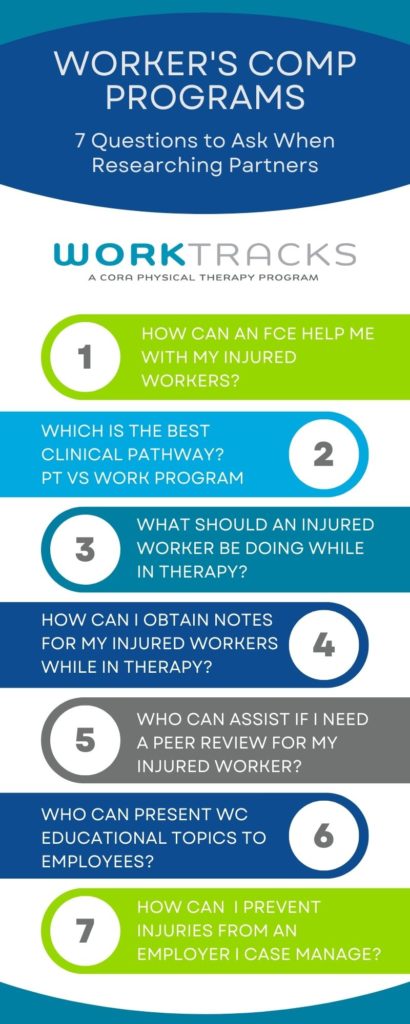
Workers’ compensation has never been more important than during a tight labor market and unsteady economy. The right partner will keep your team ready, and the right clinicians will get them back on the worksite faster.

Most people only think about workers’ compensation after an injury occurs at a job site, when the medical, legal and insurance protocols kick in. This is part of why U.S. businesses now spend more than $100 billion per year on work comp costs.
But it doesn’t have to be this way. The reality is that work comp should be a last resort, with ongoing collaboration between employers, workers, and care providers (like CORA) preventing fatigue from becoming injuries, and mitigating the effect of injuries on the business.
Please note: Work comp laws and regulations vary by state, which can affect fee schedules and smart prevention strategies. Wisconsin and Florida are at two corners of CORA’s geographic coverage area, and have very different approaches to work comp.
Why Wisconsin (and CORA) Puts The ‘W’ in Work Comp
Wisconsin empowers injured workers to seek care from any physical therapy provider, but not all care is created equal. CORA offers direct access, empowering workers to see our trained clinicians for an evaluation without requiring a referral or trip to the hospital. Through direct access, most patients can be seen on the same day that the injury occurred.
If the issue is minor, OSHA First Aid care can be provided for several visits without it becoming an official work comp claim. According to Carmelo Tenuta, a trained physical therapist who oversees CORA’s Wisconsin and Illinois regions, OSHA First Aid helps prevent about half of the possible claims.
“A physical therapy visit is extremely inexpensive as the first step of care. A lot of times, it’s just correcting behavior: don’t lift like that, lift like this instead. We also provide x-rays as needed, and KT taping to help better support a fatigued muscle or joint. This is a major advantage to both the employee and employer, streamlining recovery and costs.”
Carmelo Tenuta, PT – CORA Physical Therapy Wisconsin
When injuries do happen, CORA clinics in Wisconsin measure each stage of recovery using OccuPro, providing personalized feedback to the patient and employer.
“A lot of times a patient will go into a doctor and say, ‘I feel pretty good. I feel I can go back.’ That’s a subjective return to work, which sometimes hurts the employer with setbacks. We return people to work objectively. OccuPro was developed to tell us where you are in your recovery, based on your job description. It takes the guessing game out of work comp.”
Carmelo Tenuta, PT – CORA Physical Therapy Wisconsin
Carmelo shared this example: “You have two people with identical rotator cuff injuries. Person A is an executive in your corporate office and Person B works in a factory in Milwaukee, lifting 150-lb barrels. Once Person A is out of an immobilizer and has a decent range of motion, they can return to work. If a patient isn’t improving, all stakeholders know it. Person B has to be able to lift 150 pounds to do their job, or be reassigned to a different role.”

CORA’s WorkTracks Flying High In Florida and Beyond
Florida is more of a managed care state and operates differently from Wisconsin in addressing work comp. However, CORA’s WorkTracks program approaches care with the same outcomes in mind: preventing injuries, getting patients healthy, and getting everyone back to work.
Jaime Sigurdsson oversees CORA’s work comp services, taking pride in the program’s reputation of keeping recovered patients from suffering setbacks.
“CORA incorporates goals that are work-specific, understanding the expectations and frequency of task vs. the strength requirements of task. We address all factors that can cause recidivism, doing our best to provide education and confidence to the injured worker.”
Jaime Sigurdsson – CORA Physical Therapy, WorkTracks
A unique success story for CORA’s Florida work comp program is its partnership with Royal Caribbean, caring for performers and entertainers. Each week, performers go out on the high seas, providing trademark entertainment to thousands of cruise travelers. Injuries can come from overuse or accidents, and replacing injured performers is expensive and logistically challenging.
Upon their return to port, trained CORA clinicians work to identify First Aid interventions, fixing tweaks and fatigue before they turn into injuries.
“We work to ensure the performers are stretched, conditioned, and ready for the week ahead. I know these employees value this employer-driven opportunity to stay healthy and limit injuries.”
Jaime Sigurdsson – CORA Physical Therapy, WorkTracks
Meet CORA at the 2022 WCI Annual Conference
Need a PT partner for your business? CORA will have a premier tradeshow booth at the Workers’ Compensation Institute’s Annual Conference, August 21-24 in Orlando, and we’d love to see you!
CORA will be sponsoring wifi for conference attendees, providing seamless connectivity that you can expect from our PT services. Our exhibitors can provide immediate answers to questions, and will also be providing 1:1 treatment sessions at our Health Booth.
The theme for this year’s conference is “brighter days,” a fitting mood to match CORA’s outlook.
“While COVID threw everyone for a loop, it also opened doors to ‘what is possible.’ Where and how we provide care is evolving. CORA is embracing the ever-changing landscape and challenging ourselves to continually evolve. We see those brighter days ahead.”
Jaime Sigurdsson – CORA Physical Therapy, WorkTracks
Learn more about WorkTracks by CORA PT
Help your business protect employees today
